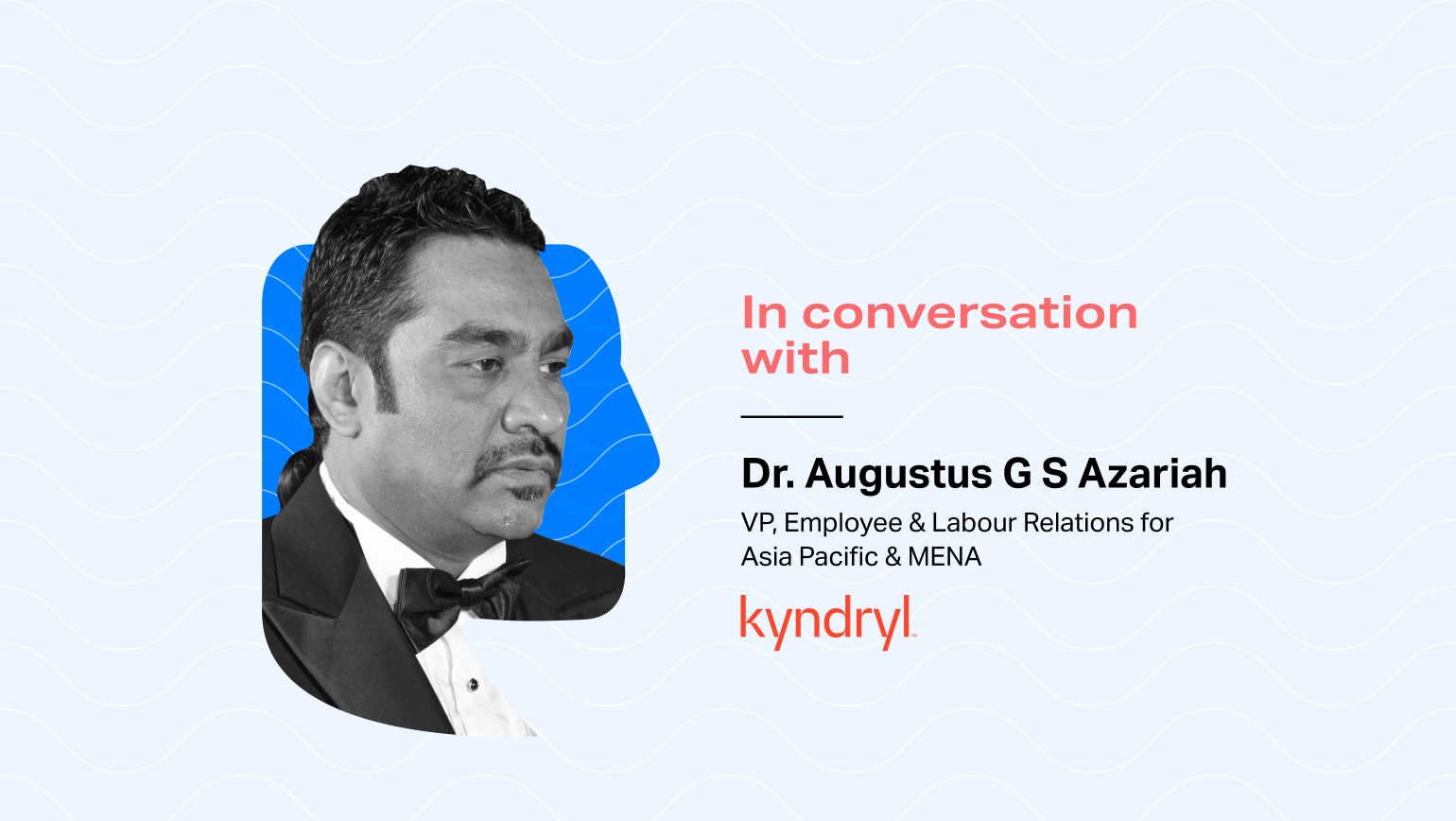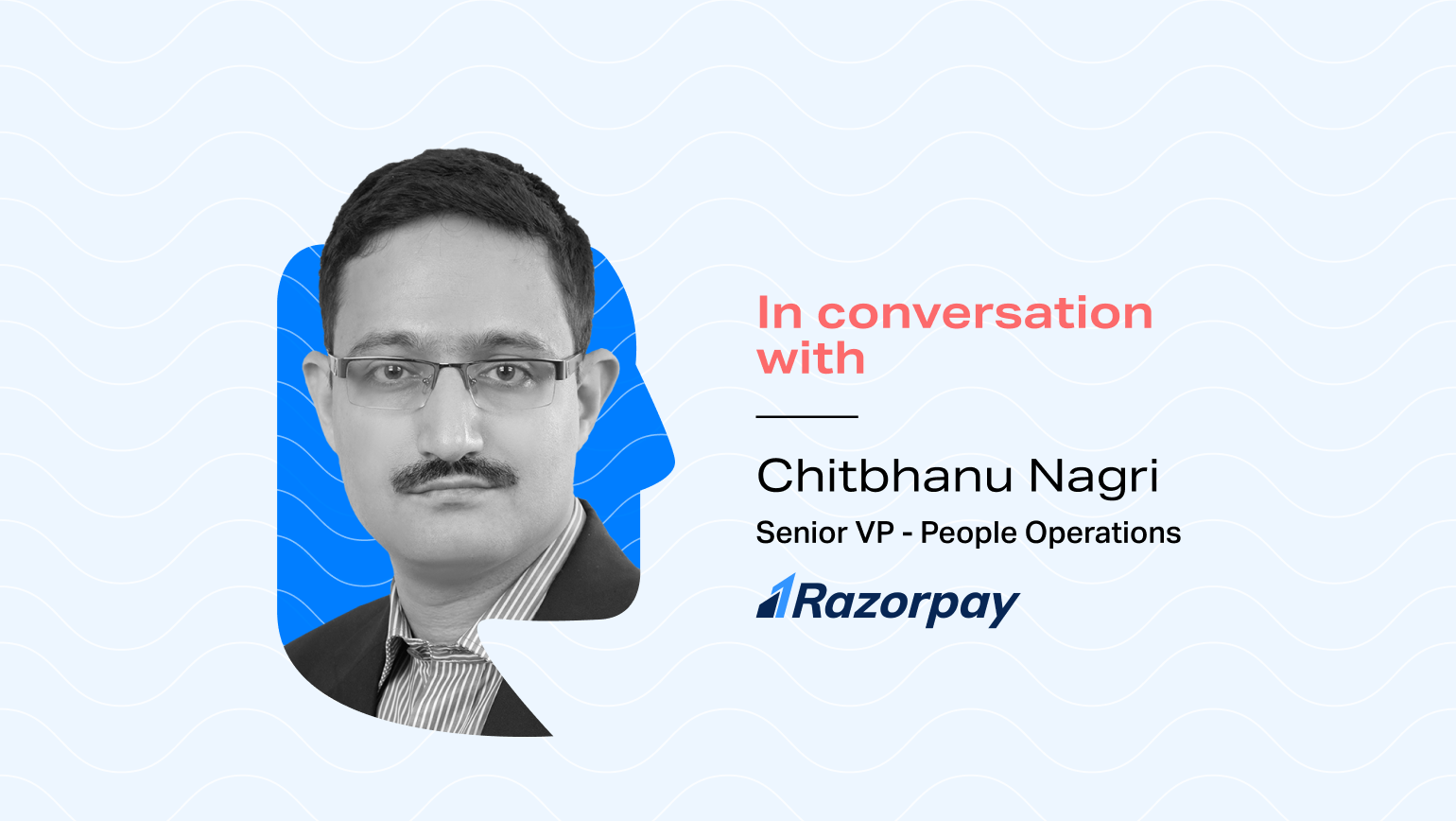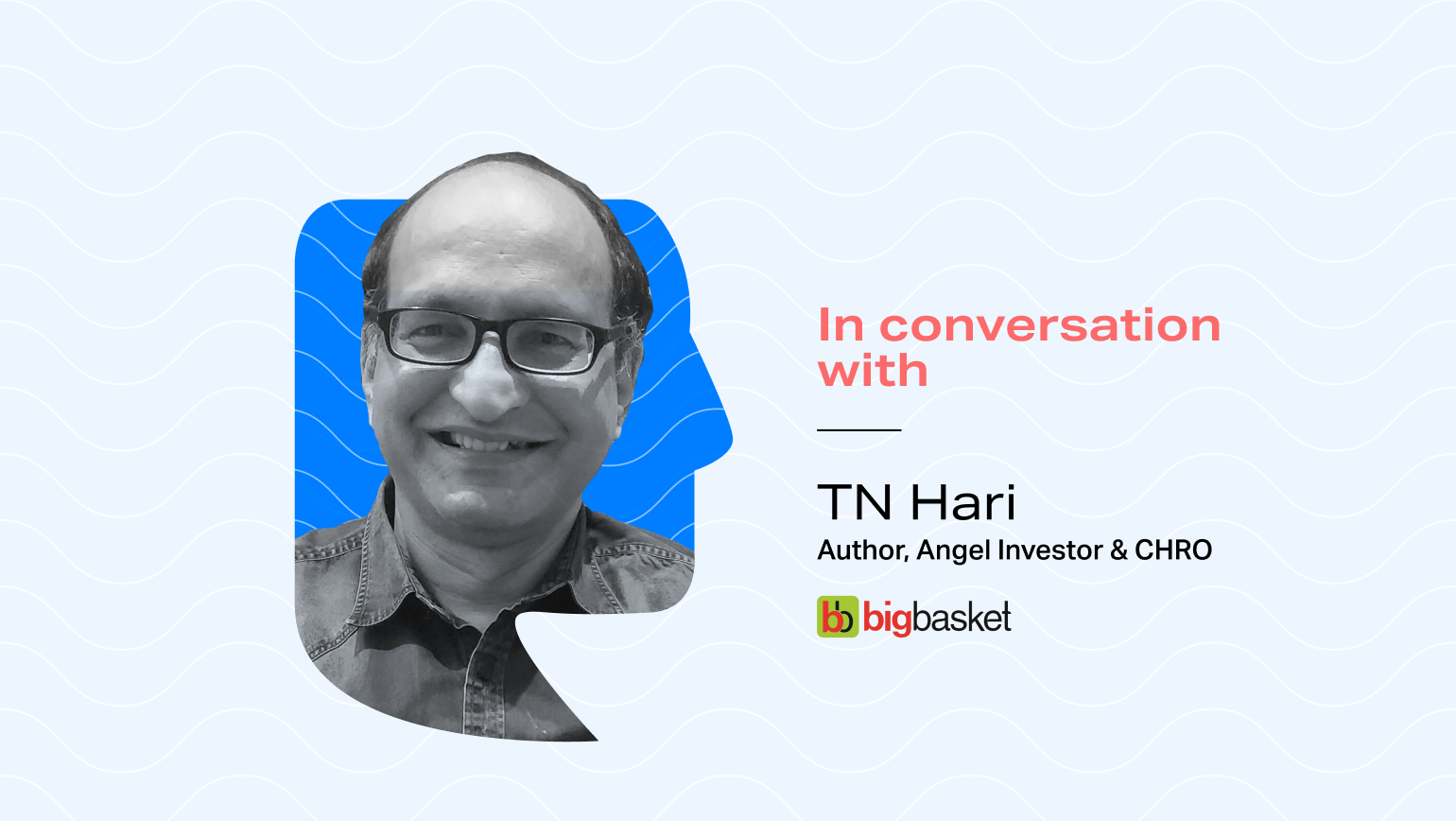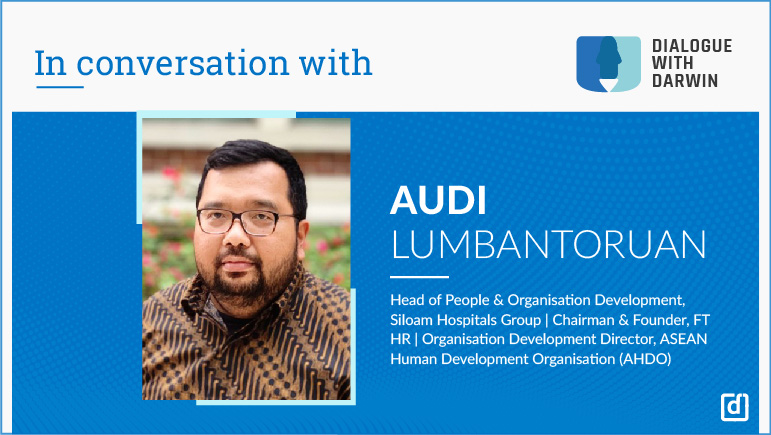 With Rajneesh Malik Global Head - Talent Management & Talent Acquisition, MindTickle
With Rajneesh Malik Global Head - Talent Management & Talent Acquisition, MindTickle
Putting People at the Heart of Business
In this interview, he talks about various aspects of organizational culture, hiring, his views on the importance of putting people at the heart of the business, and much more.
Transcript
Hello, and welcome to another episode of dialogue, a series where we with leaders from the HR space explore the evolution of HR ahead. In today’s episode, we have Rajneesh Harish Malik, the senior global director of talent acquisition at MindTickle, he comes with over 17 years of experience in people's success and specializes in scaling companies.
He's been part of scaling journeys for companies like Yahoo and Microsoft. In the last 10 years, he's been part of successful startups and private equity phones. We're excited to have him on the show and know more about his learnings and evolution journey. Thank you, Rajnesh for joining us today. Welcome to the dialogue.
Thank you, Gowthami, it's all my pleasure. Thank you for the invite.
Jumping into the conversation. We wanted to start with something we understand you are passionate about, which is scaling organizations, right? In the recent context, tell us how it has been to tackle scaling in people management during the pandemic.
And remote working scenarios. So, Gowthami, you know, uh, these last two years have been very, uh, different for all of us. In fact, you know, we have, we have not seen, uh, this time before, and we all have learned in this last two years, we have all, uh, experimented a lot as well. And, uh, when it comes to talent acquisition, or when it comes to, uh, HR or people’s success as a function, I think, uh, two years have been.
Crucial for us and to understand, uh, the, the more people side of our businesses, right? We've always been focusing on the policies on procedures, the SOPs, and things like that. But these last two years have really taught us how we look at the people aspect of, of our team members, you know, which, which includes a lot of empathy, which includes a lot of care.
A lot of inclusiveness and at the same time we have all gone remote. So, you know, the emotion. Behind all those decisions or all those actions were not seen.
So, it has become very, very difficult and, uh, different for us to kind of come up with something which is a new style of management, a new style of HR or people's success.
And again, you know, along with, with COVID in this last two years, there has been significant growth in terms of, if you look at the amount of funding, which has come in, India and organizations have scaled a lot. So these two years at the same time where we are dealing with the pandemic, we were also dealing with the growth.
So it, it, it was a very different, uh, altogether management style wherein we had to make sure that we scale at the same time, you know, We, we kind of take care of our people. We come up with processes and policies, such that, that, you know, we were able to deal with those emotions. We are able to deal with that trauma or, you know, things which are going out with the people, with their family members and, and their surroundings.
So these two years have been very, very different for us. And I think all of us have overcome that and have learned onto how to live with it.
Yeah, completely agree. I was keen to understand more about how, you know, your take has been in the last two years on the scaling front, right?
As a growing startup. That's also, it's not just about, uh, you know, catering to your current employees and ensuring they, you know, happy, engaged, and still taken care of. There's a strong influx. Newer folks that you're trying to build, right? To support the phenomenal growth that came in the form of tailwinds for digital solutions.
During the same period, it brings a lot of challenges in terms of incorporating them into the culture or, you know, helping them scale or onboard better. So what were the challenges and how was it? Uh, you know, that you approached this problem during the pandemic. I mean, this was, this was definitely a big problem to look at it because your older folks were fine.
They knew about what your culture is, what the organization is, and what is dues?
And don't, there are some silent dos and don'ts right. But a newcomer when they come in on board. Right. And at the same time, you are. You're scaling massively and you do not want to make any mistakes while you do hire, right? You want to put those checks and balances in place.
So it was important for us to provide the same experience and do the same sort of an evaluation, which is more emphasizing on the culture part rather than on the technical aspect, which is definitely important, uh, for any role to perform. But at the same time, what we were more interested in was the culture fitment, uh, of any new joiner or a new person who's going to come on.
So, there was a strong emphasis on that. And in fact, even now there is one specific round, uh, in mind, which has been taken, which is purely on the culture part, just to see whether the person would be successful in the organization or not. It's not, whether you know, is a culture fit or not. It's more about the addition, what the individual can bring into the culture part.
And that is why it's called as more of a culture, uh, culture fitment round in mind. So that is most of the, uh, important, important checks and balances. What we have put in the second thing is when a newcomer comes in the organization, right? You do not know who your point of contact is. You do not know, uh, you know, can I ping someone?
Can I slack someone? What is a good medium to kind of interact, right? Can I pick up a call or would it, you know, sound like a rule? So, you do not know those basic rules, uh, in a new setup, in a new organization, you always go around and find, uh, on your own. So, what we did in this period was we assigned a buddy to any newcomer or new joinee in the organization. At the same time, we made sure that the onboarding experience of the individuals is being taken care of smoothly so that the person is onboarded fast and can ramp up soon. Right. And again, the onboarding, it's not more about the technical onboarding.
It is more about culture onboarding. It's more about the organization onboard. Right. So those were a few things which we had to make sure that we follow rigorously because it's a difficult time. It's a remote time. You're not going to see this person in the face, like in a, in a face-to-face interactions and so on.
So, we had to make sure that these things are not skipped, and we are kind of universe to follow on that. Interesting, interesting that Denise, thank you for, uh, sharing your thoughts there. Uh, moving on to another. You know, the hot topic got the most talked about topic, right? What for talent has never been this real.
Right. Uh, how do you view the situation and what are some of the things that you were doing at mindful to attract talent? Hmm. Yeah. See, uh, I'm a strong believer in following the basics. And the basics for any, if you provide the right sort of an experience to a candidate, irrespective of the outcome, the candidate will remember the experience that he or she had in the interview process.
Right? So that is one of the strong fundamentals of mind-hiding practices. When it comes in, we really focus on the experience, and what we are going to provide to that individual. And that experience starts from the time when the person applies for a role. It's not like, you know, when you get a call from a re-tutor and then, you know, start creating those experiences or at a time offer, you create that experience.
It starts from the time when the person, uh, applies, uh, in, in the organization. Right. So, the fundamental here was to focus on, uh, you know, follow the great can experience. We know what is happening outside the out outside market. We know there is a fight for talent. We all are fighting for the similar sort of, uh, uh, folks.
Right. But the individual who had a better experience. Right. Uh, in, in the entire interview processes would, will have a plus point or would always remember about that organization. So, discussions and those interactions. So that was one of the fundamentals. We, we are kind of sticking to it and would be surprised that our offer to accept issue was 82%, which is, you know, very high or, uh, you know, not at all in the benchmark.
What industry says the industry benchmark is almost around 60%. We were higher than the industry benchmark out there. Now the other evolution that we are all going through. Right. And something that looks inevitable is the hybrid work. Right. I know we moved from work from the office to remote work to now hybrid work.
It seems like, you know, the permanent state that is here, in such a scenario, which also comes with its own complexities.
What are some of your suggestions, to handle hybrid work well from an employee standpoint? Yeah. Yeah. See, the future of work has changed. As I said, you know, the management style has changed.
The future of work has changed. Everything has just taken a 360. All of us and, must live with it. some, it's not that it's going to go back to what we wear. So mentally we all need to be prepared for it that this is what it is right now. If you look at this is very, uh, Close observation.
What I had, if you look at this generation of folks who have just entered into the corporate world, they have not seen the offices yet, right? They haven't seen, uh, their managers maybe know in, in a physical, uh, physical premises, they have just seen on a zoom call, a Google meeting and all, so this generation, when they move in the next two years and three years, definitely want to ask a question that what is the need of going to an.
Right because we were able to do it. We were able to do it for the last two years and three years. So, we do not see any reason why it needs to, we need to go back to an office. Right. And it's a very valid question. I think from an employer’s point of view, what we need to do is we need to have, trust, which is, which is the fundamental of everything, what you build around in the organization.
The trust that this, this thing is going to work. And I trust that, uh, whatever policies or procedures we come across with are going to work in the favor of an employer, as well as, you know, an employee in all these things, the automation or the tools or the, uh, or the software are going to play a critical role.
Into success of this future of work, uh, which could start from your onboarding till the exit, uh, whatever software are needed, whatever applications are needed for, uh, an employee to be successful at. I think those are going to see the peak of their time. And, uh, those will basically enable the success for the employer as well as for the employee.
How do we bring a level playing field when it comes to instilling culture? Values right. And the same set of desired behaviors in employees who are probably in, you know, different contexts we know that that's, you see a leader and you, your keen to follow that particular culture or value that's being demonstrated by the leader, which becomes very easy.
To do so in a physical environment where you're present in the office, but how do you bring that about in a hybrid space? True, true. Uh, that is absolutely true. See, again, it was easy for us, uh, to represent the culture or to, you know, to, uh, reciprocate it because we were. Physically present in the office. And we had seen that we have learned that these other ways, like the body language, is a way, the tone is a way.
Those are the were the few levers. What we, we had seen in the past, they were working out now because of the new setup, we are still yet to identify what those levers are. Right now, uh, most of the time, you know, people do not even switch on the videos, and you're just having a conversation with your colleague and think, and you do not know what is going.
What is that individual working on? So that is why those levers cannot work now. Right. We need to identify what those new levers are. And we are yet to identify that. I am not saying that we have a hundred percent answer for that. But what is important is, uh, even the culture or the values, right?
When you see a particular value, which is being followed in the organization is being represented by someone. It is, it is an important time for that leader or for that team to appreciate that and to call out that. So, reinforcement of what you follow. What your culture is, is very, very important, right?
Especially because we are not seeing each other's faces, uh, we are just seeing the actions or we are just seeing what the person has done, what the person has delivered as a task, and so on. So those small, small wins what you have. It is very, very important to highlight why it is so, uh, close to our culture.
What was the significance of that action? And so on. And similarly, if it is going against your culture, you need to highlight that, you know, this is not part of your culture, why it is not part of your culture, right? So, uh, a, reinforcement of this practices, these behaviors, I think that needs to be continued and maybe on an onboarding period, or even like, you know, six months, one year down the line, you can have pieces of training, which are kind of telling you that, okay, this is what my, uh, my teams, my company's culture.
Recognition has become more important than being able to do that at the right time for the right behavior. So that’s reinforced. I think has become far, far more valuable in the recent past. Uh, thank you so much for sharing those insights. Uh, it's interesting to learn what you're doing and it's interesting to know how you foresee, and how things might shape in the future.
Uh, and definitely the generational context has. Extremely, uh, impacting today in terms of, you know, what works for those who have started working in the last two years versus, you know, someone who's always been there. Uh, but we want to quickly move on to another section where we want to learn a bit about your personal evolution and in, you know, as much fashion as possible in one word or one phrase answers.
Um, if you were given the option of, uh, working in a hybrid mode, where would you like to work from? Even now I have that option by the way. but I'm working out of Pune close to the office, but let's say hypothetically, even if I did not go by that particular option, I would go to Mumbai, and then live from Mumbai because I'm a city person who loves the city noise.
I like to see people right around me. And, if I am not able to kind of interact with people or if I can't find a lot of people around me, then, you know, it starts bothering me. So, I definitely go back to Mumbai where I am,
interesting to learn. And I understand that everyone has their own preference.
Yeah. we can, we can always like assume to hear beaches and mountains in this fashion, but it's interesting to know that you want to pick. The busiest city in the country, in one word or phrase, how would you describe your leadership style?
I would say that, enabling people, and unblocking them.
I think that's my style of leadership, uh, as first by giving all the freedom and all. So, I kind of think wherever I can enable them to be successful and wherever I can unblock them so that they can move. I think that is what I kind of focus more on. Okay. Interesting. Uh, what is one learning that changed you like in or beyond work?
Uh, from the pan pandemic base? Beyond work. Right. Okay. Yeah. Yeah., these two years again, um, have, uh, have changed me a lot from a personality point of view. You know, we always knew that health is important for us, and health is well, but you know, being in the corporate, uh, role and with the startups and all the organization demands a lot from you.
You end up working more and since you are young, you've not had to bother more to put in more extra hours and things like that. But these last two years, I realized the importance of health here, you know, uh, and I've personally started investing more into it. Uh, I started, you know, to, to go out, work out, run and, uh, go to the gym and do my daily workout.
So, I think that is where I have kind of changed myself and started, uh, investing more time and the same thing I've been asking my team members also to do, to kind of go and do it. And how important is this? Uh, both your mental health as well as your physical health is very, very important. These. What is one company's culture that you admire the most, uh, that you learned from the large nation?
the very, very straightforward answer for me. It's Netflix. And what I like about them is, you know, they, they quote saying that we hire only fully formed adults, you know?
what fully formed adults are, but I think we do not know what is fully formed adult is right. A fully form is a person who is responsible for his own, uh, decisions and can take, you know, own decisions, have the freedom, luxury to do that at the same time, be responsible for it, you know?
So, I think that is what that is. One of the companies I wish I really, like in terms of their culture. Thank you. Thank you so much it's been wonderful speaking to you.
Great insights and, uh, a very authentic conversation that I've enjoyed. Uh, thank you. And look to hosting again. Thank you so much.
Thank you so much. All my pleasure. Take Care.
Nominate Myself
Nominate Someone Else
Your Sunday Watchlist
 With Augustus Azariah
With Augustus Azariah
Employee & Labor Relations Leader at Kyndryl
Listen to his insights on the ‘Future of Work,’ that much-debated topic – hybrid work, talent management and much more.
 With Chitbhanu Nagri
With Chitbhanu Nagri
Sr VP of People Operations at Razorpay
Listen to his insights on organizational culture, talent retention, and some learnings from his current role at Razorpay.
 With Priya Chakravarty
With Priya Chakravarty
Sr Director HR in Essar Capital
Listen to her insights on managing a distributed and diverse workforce in the hybrid work setup, and some interesting HR initiatives at Essar Capital.
 With TN Hari
With TN Hari
Author, Angel Investor, CHRO, Big Basket
Listen to his insights on building a sustainable company culture in the hybrid world.






